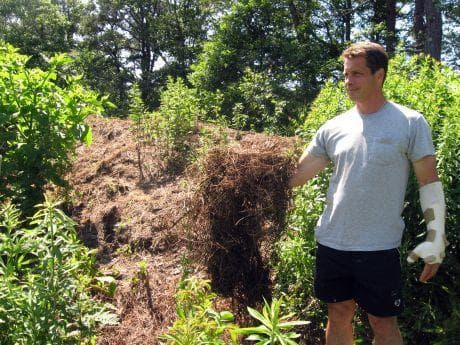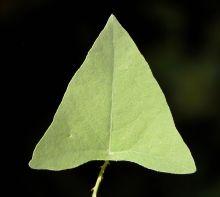Advertisement
Battling A Destructive Vine That Grows A 'Mile-A-Minute'
Resume
David Connors owns a farm where he keeps a couple horses, raises vegetables, and has a small vineyard and orchard. But lately something else has been growing there that he didn't plant and doesn't want.
"It's all over," Connors says as he kicks at a tangle of long, green vines snaking through the grass. "I mean, I have it in my lawn. Like, this is dead stuff that I cut. See that there? And it's loaded with thorns."
The vines have perfectly triangular leaves and sharp little spikes, like needles. For weeks, Connors has been pulling these vines out of his fields and garden, and he has hundreds of inflamed scratches on his arms to prove it.
"Why I'm not letting this run unchecked is it's destroying everything around it," Connors says.
This nasty stuff is a weed called mile-a-minute, because of how quickly it spreads: up to six inches a day. The vine crawls over other types of vegetation, cutting off their sunlight and often killing them.
Mile-a-minute is one of many invasive species in Massachusetts. But it first showed up here only three years ago. And since it's so new to the state, wildlife officials hope to eliminate it before it spreads any more. Because once invasive plants take root, they're usually tough to get rid of.
So far, mile-a-minute has been found in only two towns in Massachusetts: Falmouth and Milton, in the Blue Hills. On Connors's farm, huge mounds of vines that he's yanked from the ground are piled up like dried seaweed.

"Everywhere you see, bare ground was loaded," Connor says. "Just absolutely covered. This is what we pulled up — huge clumps of it, like that. This is just a tiny bit compared to what was here."
Connors isn't the only person who wants to get rid of mile-a-minute.
"This plant is hell," says Ted Elliman, who works for the New England Wild Flower Society and tracks invasive plants in the region. "This plant is very difficult to eradicate, it spreads very rapidly, it's got barbs that rip your skin and rip your clothing, and it smothers other vegetation."
Invasives such as mile-a-minute are non-native species that can harm native populations. Elliman says mile-a-minute began appearing in the mid-Atlantic states several decades ago. It was probably spread by bird droppings and it now stretches from New York to Virginia.
"There's a chance we can catch it," Elliman says, "but we have to get on it right now. It's going to be a battle."
Mile-a-minute kills native plants and drives away animals that need those native species for food and shelter. So Massachusetts conservation agencies are organizing efforts to get rid of the weed. Elliman says that usually means pulling out the weeds by hand or applying herbicides.
"I would really encourage homeowners to look for this," Elliman says. "If they're planting rhododendron bushes or whatever, if you see this plant, pull it out of the ground right away."
That's because mile-a-minute can easily jump from private yards to the natural landscape. But if it's removed before it produces its glossy blue berries, that prevents it from re-seeding later.
Jim Rassman works for the state conservation department in Falmouth, one of the two towns where mile-a-minute is spreading. He thinks the infestation is new enough here that Massachusetts can eliminate the weed for good.
"If you're at front of the invasion, you try to quarantine it and push it back," Rassman says. "And mile-a-minute is a good example of that. So statewide we think we can push it all the way out."
Mile-a-minute could also have an economic impact. Conservationists worry it could spread to Christmas tree farms and commercial nurseries and harm those businesses.
If Massachusetts does defeat the mile-a-minute vine, it would be a rare success story in the ongoing fight against invasive species. And it would be a victory for the other plants and animals whose habitats are threatened by the fast-growing weed.
This program aired on July 16, 2009.
